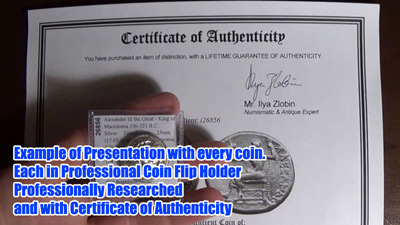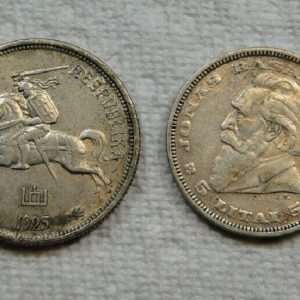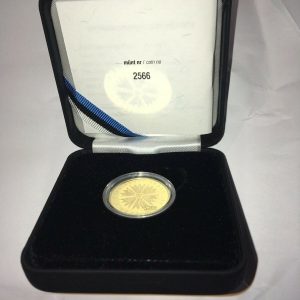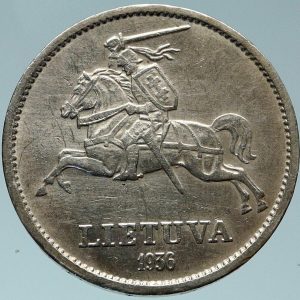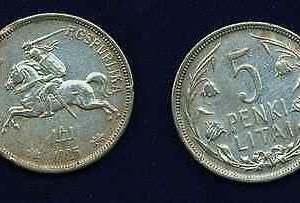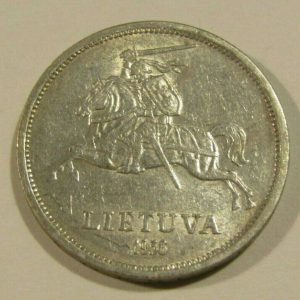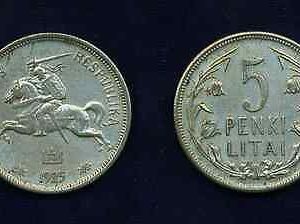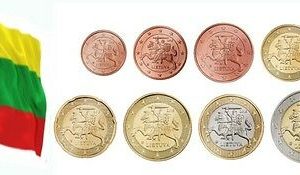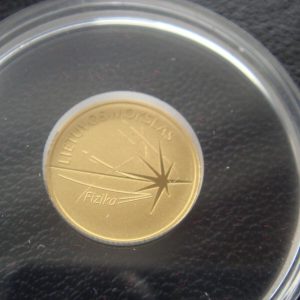|
Lithuania – Dr. Jonas Basanavičius Commemorative Issue
1936 Silver 5 Litai 26mm (8.99 grams) 0.750 Silver (0.217 oz. ASW)
Reference: KM# 82 (1936)
JONAS BASANAVIČIUS 5 LITAI, Bust facing left.
LIETUVA Reverse; Year, National arms held by rider on horseback.
Edge: TAUTOS GEROVĖ TAVO GEROVĖ
You are bidding on the exact item pictured, provided with a Certificate of Authenticity and Lifetime Guarantee of Authenticity.
Jonas Basanavičius(Jan Basanowicz; 23 November 1851 – 16 February 1927) was an activist and proponent of the Lithuanian National Revival. He participated in every major event leading to the _cropped.jpg/200px-Jonas_Basanavicius_(1851-1927)_cropped.jpg) independent Lithuanian state and is often given the informal honorific title of the ‘Patriarch of the Nation’ (Lithuanian: tautos patriarchas) for his contributions. independent Lithuanian state and is often given the informal honorific title of the ‘Patriarch of the Nation’ (Lithuanian: tautos patriarchas) for his contributions.
Born to a family of farmers, Basanavičius was to become a priest but instead chose to study medicine at the Moscow Medical Academy. He worked as a doctor from 1880 to 1905 in the Principality of Bulgaria. Despite the long distance, he dedicated substantial effort to the Lithuanian cultural work. He founded the first Lithuanian-language newspaper Aušra (1883), contributed articles on Lithuania to the press, collected samples of Lithuanian folklore (songs, fairy-tales, legends, riddles, etc.) and published them. He was also involved with local Bulgarian politics. He returned to Lithuania in 1905 and immediately joined Lithuanian cultural life. He became chairman of the organizing committee of the 1905 Great Seimas of Vilnius. In 1907, he founded the Lithuanian Scientific Society, a learned society dedicated to Lithuanian history, ethnography, linguistics. Basanavičius became chairman of the society and dedicated the rest of his life to its affairs. In 1917, he was elected by the Vilnius Conference to the Council of Lithuania. He chaired the council’s session that adopted the Act of Independence of Lithuania on 16 February 1918 and was the first to sign it. In the aftermath of World War I, Vilnius changed hands and regimes several times, but Basanavičius refused to leave safeguarding city’s museums, libraries, archives and continuing his life-long research of Lithuanian cultural matters. After the Żeligowski’s Mutiny in October 1920, Vilnius became part of Poland and Lithuanian activities were censored and limited. Basanavičius’ continued presence in the city became a symbol of Lithuanian claims to the bitterly contested Vilnius Region. When he died in 1927, the Lithuanian government declared a five-day mourning period.
 Lithuania officially the Republic of Lithuania (Lithuanian: Lietuvos Respublika), is a country in the Baltic region of northern-eastern Europe. Since its independence, Lithuania has been referred to as one of the Baltic states. It is situated along the southeastern shore of the Baltic Sea, to the east of Sweden and Denmark. It is bordered by Latvia to the north, Belarus to the east and south, Poland to the south, and Kaliningrad Oblast (a Russian exclave) to the southwest. Lithuania has an estimated population of 2.8 million people as of 2017, and its capital and largest city is Vilnius. Other major cities are Kaunas and Klaipėda. Lithuanians are a Baltic people. The official language, Lithuanian, along with Latvian, is one of only two living languages in the Baltic branch of the Indo-European language family. Lithuania officially the Republic of Lithuania (Lithuanian: Lietuvos Respublika), is a country in the Baltic region of northern-eastern Europe. Since its independence, Lithuania has been referred to as one of the Baltic states. It is situated along the southeastern shore of the Baltic Sea, to the east of Sweden and Denmark. It is bordered by Latvia to the north, Belarus to the east and south, Poland to the south, and Kaliningrad Oblast (a Russian exclave) to the southwest. Lithuania has an estimated population of 2.8 million people as of 2017, and its capital and largest city is Vilnius. Other major cities are Kaunas and Klaipėda. Lithuanians are a Baltic people. The official language, Lithuanian, along with Latvian, is one of only two living languages in the Baltic branch of the Indo-European language family.
 For centuries, the southeastern shores of the Baltic Sea were inhabited by various Baltic tribes. In the 1230s, the Lithuanian lands were united by Mindaugas, the King of Lithuania, and the first unified Lithuanian state, the Kingdom of Lithuania, was created on 6 July 1253. During the 14th century, the Grand Duchy of Lithuania was the largest country in Europe; present-day Lithuania, Belarus, Ukraine, and parts of Poland and Russia were the territories of the Grand Duchy. With the Lublin Union of 1569, Lithuania and Poland formed a voluntary two-state union, the Polish-Lithuanian Commonwealth. The Commonwealth lasted more than two centuries, until neighbouring countries systematically dismantled it from 1772 to 1795, with the Russian Empire annexing most of Lithuania’s territory. For centuries, the southeastern shores of the Baltic Sea were inhabited by various Baltic tribes. In the 1230s, the Lithuanian lands were united by Mindaugas, the King of Lithuania, and the first unified Lithuanian state, the Kingdom of Lithuania, was created on 6 July 1253. During the 14th century, the Grand Duchy of Lithuania was the largest country in Europe; present-day Lithuania, Belarus, Ukraine, and parts of Poland and Russia were the territories of the Grand Duchy. With the Lublin Union of 1569, Lithuania and Poland formed a voluntary two-state union, the Polish-Lithuanian Commonwealth. The Commonwealth lasted more than two centuries, until neighbouring countries systematically dismantled it from 1772 to 1795, with the Russian Empire annexing most of Lithuania’s territory.
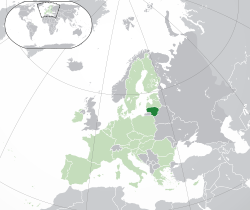 As World War I neared its end, Lithuania’s Act of Independence was signed on 16 February 1918, declaring the founding of the modern Republic of Lithuania. In the midst of the Second World War, Lithuania was first occupied by the Soviet Union and then by Nazi Germany. As World War II neared its end and the Germans retreated, the Soviet Union reoccupied Lithuania. On 11 March 1990, a year before the formal dissolution of the Soviet Union, Lithuania became the first Baltic state[12] to declare itself independent, resulting in the restoration of an independent State of Lithuania after 50 years of Soviet occupation. As World War I neared its end, Lithuania’s Act of Independence was signed on 16 February 1918, declaring the founding of the modern Republic of Lithuania. In the midst of the Second World War, Lithuania was first occupied by the Soviet Union and then by Nazi Germany. As World War II neared its end and the Germans retreated, the Soviet Union reoccupied Lithuania. On 11 March 1990, a year before the formal dissolution of the Soviet Union, Lithuania became the first Baltic state[12] to declare itself independent, resulting in the restoration of an independent State of Lithuania after 50 years of Soviet occupation.
Lithuania is a member of the European Union, the Council of Europe, a full member of the eurozone, Schengen Agreement, OECD and NATO. It is also a member of the Nordic Investment Bank, and part of Nordic-Baltic cooperation of Northern European countries. The United Nations Human Development Index lists Lithuania as a ‘very high human development’ country.
|

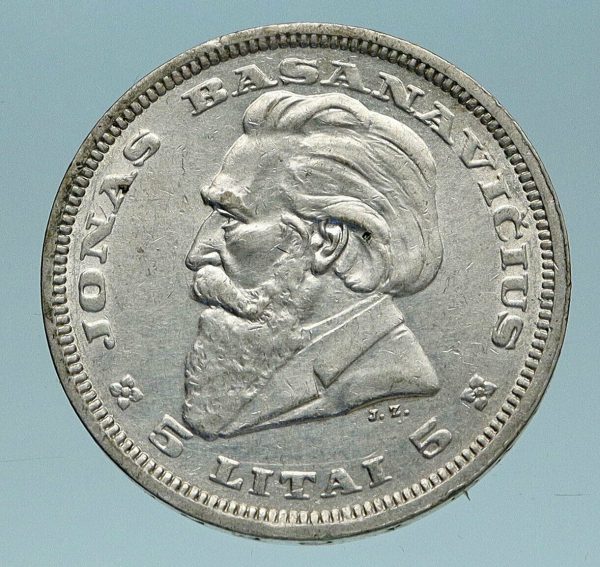
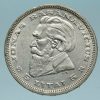


_cropped.jpg/200px-Jonas_Basanavicius_(1851-1927)_cropped.jpg) independent Lithuanian state and is often given the informal honorific title of the ‘Patriarch of the Nation’ (Lithuanian: tautos patriarchas) for his contributions.
independent Lithuanian state and is often given the informal honorific title of the ‘Patriarch of the Nation’ (Lithuanian: tautos patriarchas) for his contributions.  Lithuania officially the Republic of Lithuania (Lithuanian: Lietuvos Respublika), is a country in the Baltic region of northern-eastern Europe. Since its independence, Lithuania has been referred to as one of the Baltic states. It is situated along the southeastern shore of the Baltic Sea, to the east of Sweden and Denmark. It is bordered by Latvia to the north, Belarus to the east and south, Poland to the south, and Kaliningrad Oblast (a Russian exclave) to the southwest. Lithuania has an estimated population of 2.8 million people as of 2017, and its capital and largest city is Vilnius. Other major cities are Kaunas and Klaipėda. Lithuanians are a Baltic people. The official language, Lithuanian, along with Latvian, is one of only two living languages in the Baltic branch of the Indo-European language family.
Lithuania officially the Republic of Lithuania (Lithuanian: Lietuvos Respublika), is a country in the Baltic region of northern-eastern Europe. Since its independence, Lithuania has been referred to as one of the Baltic states. It is situated along the southeastern shore of the Baltic Sea, to the east of Sweden and Denmark. It is bordered by Latvia to the north, Belarus to the east and south, Poland to the south, and Kaliningrad Oblast (a Russian exclave) to the southwest. Lithuania has an estimated population of 2.8 million people as of 2017, and its capital and largest city is Vilnius. Other major cities are Kaunas and Klaipėda. Lithuanians are a Baltic people. The official language, Lithuanian, along with Latvian, is one of only two living languages in the Baltic branch of the Indo-European language family.  For centuries, the southeastern shores of the Baltic Sea were inhabited by various Baltic tribes. In the 1230s, the Lithuanian lands were united by Mindaugas, the King of Lithuania, and the first unified Lithuanian state, the Kingdom of Lithuania, was created on 6 July 1253. During the 14th century, the Grand Duchy of Lithuania was the largest country in Europe; present-day Lithuania, Belarus, Ukraine, and parts of Poland and Russia were the territories of the Grand Duchy. With the Lublin Union of 1569, Lithuania and Poland formed a voluntary two-state union, the Polish-Lithuanian Commonwealth. The Commonwealth lasted more than two centuries, until neighbouring countries systematically dismantled it from 1772 to 1795, with the Russian Empire annexing most of Lithuania’s territory.
For centuries, the southeastern shores of the Baltic Sea were inhabited by various Baltic tribes. In the 1230s, the Lithuanian lands were united by Mindaugas, the King of Lithuania, and the first unified Lithuanian state, the Kingdom of Lithuania, was created on 6 July 1253. During the 14th century, the Grand Duchy of Lithuania was the largest country in Europe; present-day Lithuania, Belarus, Ukraine, and parts of Poland and Russia were the territories of the Grand Duchy. With the Lublin Union of 1569, Lithuania and Poland formed a voluntary two-state union, the Polish-Lithuanian Commonwealth. The Commonwealth lasted more than two centuries, until neighbouring countries systematically dismantled it from 1772 to 1795, with the Russian Empire annexing most of Lithuania’s territory.  As World War I neared its end, Lithuania’s Act of Independence was signed on 16 February 1918, declaring the founding of the modern Republic of Lithuania. In the midst of the Second World War, Lithuania was first occupied by the Soviet Union and then by Nazi Germany. As World War II neared its end and the Germans retreated, the Soviet Union reoccupied Lithuania. On 11 March 1990, a year before the formal dissolution of the Soviet Union, Lithuania became the first Baltic state[12] to declare itself independent, resulting in the restoration of an independent State of Lithuania after 50 years of Soviet occupation.
As World War I neared its end, Lithuania’s Act of Independence was signed on 16 February 1918, declaring the founding of the modern Republic of Lithuania. In the midst of the Second World War, Lithuania was first occupied by the Soviet Union and then by Nazi Germany. As World War II neared its end and the Germans retreated, the Soviet Union reoccupied Lithuania. On 11 March 1990, a year before the formal dissolution of the Soviet Union, Lithuania became the first Baltic state[12] to declare itself independent, resulting in the restoration of an independent State of Lithuania after 50 years of Soviet occupation. 
